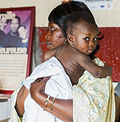
The Decade of Vaccines (DoV) initiative was introduced at the World Economic Forum in Davos in 2010 with a pledge by the Bill & Melinda Gates Foundation to dedicate US$10 billion to researching, developing and delivering vaccines for the world’s poorest countries.
The initiative quickly gained momentum as key international agencies signed up to its mission: “to extend, by 2020 and beyond, the full benefits of immunisation to all people, regardless of where they are born, who they are, or where they live”.
In December 2010, the World Health Organization (WHO), UNICEF, the US National Institute of Allergy and Infectious Diseases (NIAID) and the Bill & Melinda Gates Foundation formally launched the DoV and a plan to create a Global Vaccine Action Plan (GVAP).
The DoV is seen as an important part of global efforts to save millions of lives, enhance economic activity and deliver on Millennium Development Goal #4 (reducing under-five mortality by two-thirds by 2015).
Following extensive consultations with DoV stakeholders – including industry groups such as IFPMA and BIO – a final draft of the GVAP was presented and endorsed at the 65th World Health Assembly in May 2012.
Next steps
To mark World Immunisation Week, a new paper published in a , takes stock of progress to date and examines what needs to be done to turn the aspirations of the GVAP into reality.
The authors outline the investment in research made by vaccine manufacturers which has seen the introduction in recent years of vaccines against cervical cancers, meningococcal disease, influenza, pneumococcal disease, rotavirus and shingles.
Vaccines currently in development include vaccines against Dengue Fever, C. difficile, Malaria and TB. Of the 201 products currently in development, more than half (54%) target neglected diseases or conditions which disproportionately affect the world’s poorest people.
In addition to researching and developing innovative vaccines, the article says that the research-based vaccines industry also contributes to initiatives such as the GAVI Alliance, a public-private partnership dedicated to enhancing access to immunisation.
Sustaining progress on access to vaccines will necessitate overcoming several challenges, including increased regulatory requirements, rising costs of vaccine development and production, difficulties raising finance for investing in new projects, and the complexity of predicting demand for new vaccines in developing countries.
The authors call for all countries to declare immunisation as a priority; greater efforts to build public trust in vaccines so that individuals view vaccines as their “right and responsibility”; and strengthened immunisation systems for routine delivery of vaccination.
Costs criticised
The Decade of Vaccines Collaboration (DOVC) has not been beyond criticism, with some NGOS calling for more action on reducing vaccine pricing.
Médecins Sans Frontières (MSF) says the cost of vaccines jeopardises the sustainability of immunisation programmes in developing countries. With new vaccines added to the basic immunisation package in recent years, the total cost has risen significantly.
“The cost of fully vaccinating a child has risen from $1.38 to $38.80 over the last decade, so it is puzzling that the vaccines blueprint for the next decade does not have a goal to bring prices down,” said Dr Manica Balasegaram, executive director of MSF’s Access Campaign. “Governments in countries where we work are increasingly worried about how they will foot the bill for vaccines when donor support tapers off.”
The organisation says new vaccines have dramatically increased the cost of the basic vaccines package and it calls for greater use of low-cost manufacturers who promise to supply products at a lower price than the research-based companies that developed them.
New vaccines are typically more expensive than older off-patent products as companies strive to recoup the R&D investment required to support innovation. However, research-based vaccine companies are working closely with GAVI to make all new vaccines sufficiently affordable for low-income countries.
MSF has also expressed alarm at the logistical difficulties faced when trying to deliver vaccines in remote or rural areas. Many of today’s vaccines must be kept cold or given in multiple doses requiring several clinic visits.
The development and approval of innovative vaccine delivery techniques which do not require injection should be speeded up, according to MSF.
While critics frame the issue as a debate over the purchase price of vaccines, the article in Vaccine emphasises the total delivery cost of vaccination and the investment required to develop new vaccines and delivery methods.
While this disagreement between MSF and manufacturers is unlikely to end before the 2020 deadline, there can be little doubt that the Decade of Vaccines has put immunisation higher on the global health agenda than ever before.
World Immunisation Week runs from April 22-29




